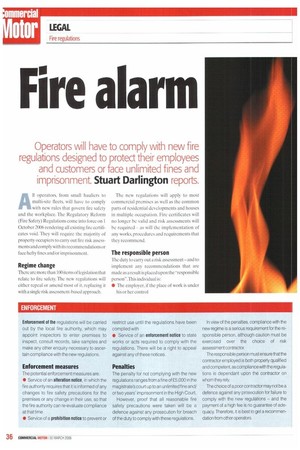ENFORCEMENT
Page 36

If you've noticed an error in this article please click here to report it so we can fix it.
Enforcement of the regulations will be carried out by the local fire authority, which may appoint inspectors to enter premises to inspect: consult records, take samples and make any other enquiry necessary to ascertain compliance with the new regulations.
Enforcement measures
The potential enforcement measures are:
• Service of an alteration notice, in which the fire authority requires that it is informed of any changes to fire safety precautions for the premises or any change in their use, so that the fire authority can re-evaluate compliance at that time
• Service of a prohibition notice to prevent or restrict use until the regulations have been complied with
• Service of an enforcement notice to state works or acts required to comply with the regulations. There will be a right to appeal against any of these notices.
Penalties
The penalty for not complying with the new regulations ranges from a fine of -25,000 in the magistrate's court up to an unlimited fine and/ or two years' imprisonment in the High Court.
However, proof that all reasonable fire safety precautions were taken will be a defence against any prosecution for breach of the duty to comply with these regulations. In view of the penalties, compliance with the new regime is a serious requirement for the responsible person, although caution must be exercised over the choice of risk assessment contractor.
The responsible person must ensure that the contractor employed is both properIyqualified and competent, as compliance with the regulations is dependant upon the contractor on whom they rely.
The choice of a poor contractor may not be a defence against any prosecution for failure to comply with the new regulations and the payment of a high fee is no guarantee of adequacy. Therefore, it is best to get a recommendation from other operators.






























































































































































































